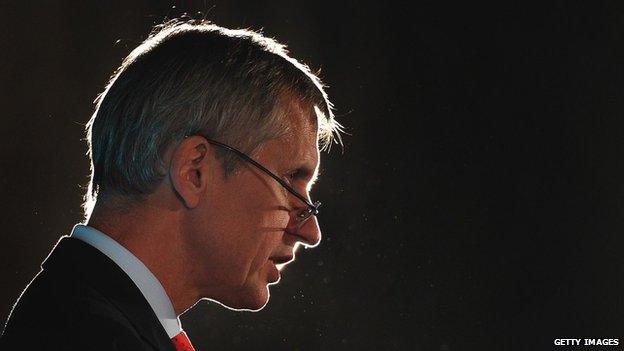Treasury bundles FCA boss out of the door
- Published
- comments

Make no bones about it, the Treasury was behind Martin Wheatley's surprise decision to stand down as the head of the Financial Conduct Authority.
I am told that discussions were held with the head of the FCA in recent weeks where it was made clear that the chancellor would not be asking Mr Wheatley to stay on when his contract came up for renewal in March 2016.
With that sword hanging over his head, Mr Wheatley decided that he would go early.
Gung-ho
The Treasury has always had a scratchy relationship with Mr Wheatley who famously said he would "shoot first" and ask questions later when he came across wrong doing in the financial services sector.
The banking industry didn't much like such a gung-ho attitude and Mr Wheatley was often the subject of poisonous comments from senior banking executives.
The FCA also blundered over leaked details of an inquiry into the savings industry. You can read about that shambles here.
Mr Wheatley was very much his own man and he received widespread praise for his aggressive "pro-consumer" attitude - for example leading the charge against the payday loan industry.
The problem seems to be, he wasn't Mr Osborne's man.
Update: 13.14
So, the Treasury got rid of Mr Wheatley. And it is now becoming clear that the head of the FCA is not happy about that at all.
Talking to those close to the now former head of the FCA, it seems he believes the Treasury was looking for a "big signal" that it was time for a different type of relationship with the City.
Less banker bashing, more supportive of the changes that the City believes it has made on issues of conduct since the financial crisis.
It seems Mr Wheatley did not fit the bill. I asked one person if Mr Wheatley "felt sore" about how he had been treated.
"Oh yes," came the reply.
Tub thump
In the chancellor's Mansion House speech, George Osborne spoke of "a new settlement" with the financial services sector.
Mr Wheatley believed he was talking a similar language, saying that the FCA's aggressive push on conduct issues (look at the large fines for foreign exchange manipulation) had successfully pushed the issue to the level of the board room.
Where it should be, he believed.
It seems Mr Wheatley agreed that the tone and the way of working should now be subtly changed - very much because of the success of the FCA in its more tub-thumping start-up phase (the regulator was formally launched in 2013).
But it appears Mr Osborne did not agree that Mr Wheatley was the man to lead that change.